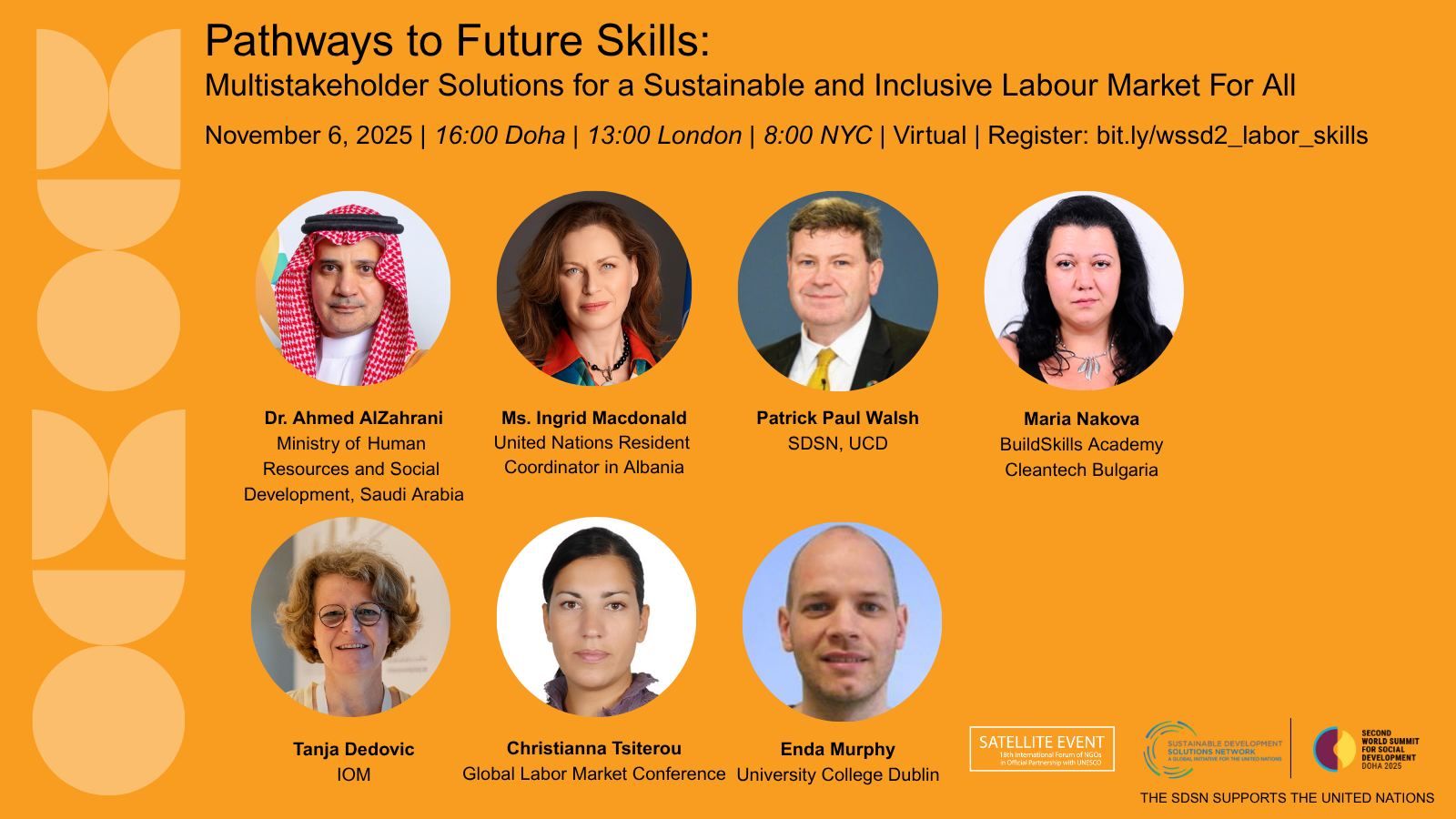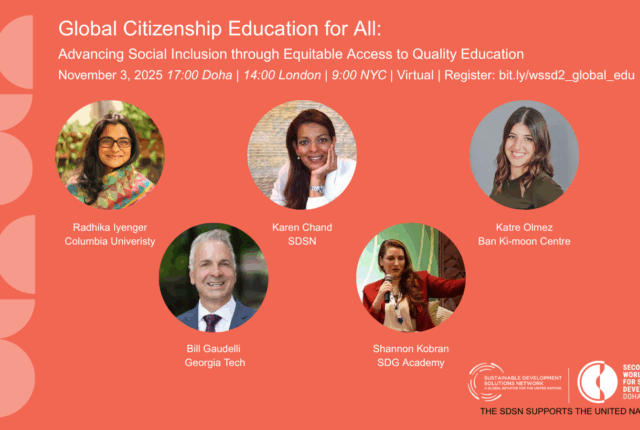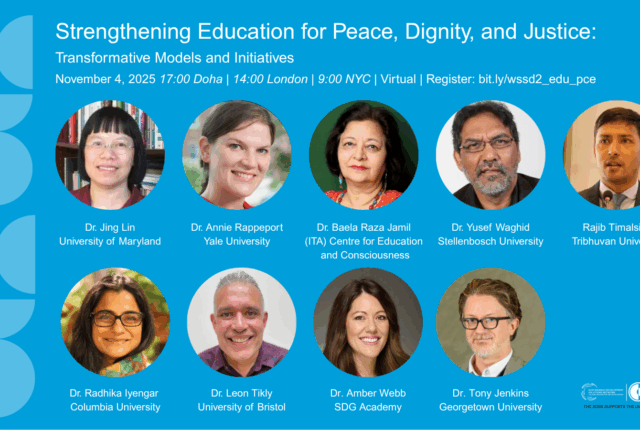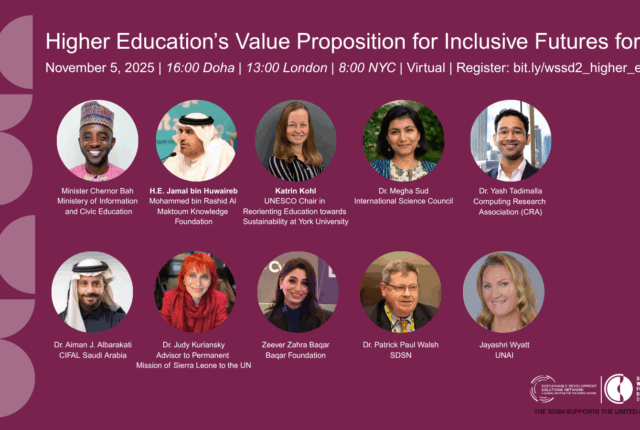“Most institutions, programs, and policies of the labor market were set for a different era. Technology is moving faster than education; it’s moving faster than labor market policies and regulations. We need a system that does not only ensure responsiveness, but also agility.”
Dr Ahmed AlZahrani, the Deputy Minister for Skills and Training, Ministry of Human Resources and Social Development, Saudi Arabia
The Second World Summit for Social Development, held in Doha and online in the first week of November 2025, offered a timely opportunity to not only celebrate progress thirty years after the adoption of the Copenhagen Declaration on Social Development, but also to address persistent gaps that hinder inclusive and sustainable growth, such as the promotion of full employment and decent work for all.
To contribute to this important discussion, SDSN, together with University College Dublin (UCD), Government of Ireland SDG Champion, International Organization for Migration (IOM), and United Nations Institute for Training and Research (UNITAR), joined forces to host an official online side event on “Pathways to Future Skills: multistakeholder solutions for a sustainable and inclusive labor market for all”.
The event sought to put in evidence the critical gap affecting the promotion of full employment and decent work for all. The global labor market is facing growing pressures, as an aging workforce and outdated skills collide with rapid technological and green transitions. In Europe, 70% of companies report difficulty in finding qualified workers for green and digital jobs. Meanwhile, flexible lifelong learning options remain limited, especially for older and vulnerable workers. Employees in SMEs and migrants with unrecognized qualifications face barriers to reskilling.
Building on the dialogue from the 2025 EU Green Week, where multistakeholder cooperation between policymakers, industry, educators and practitioners emerged as a key driver of inclusive and agile labor systems, the webinar showcased several future-oriented initiatives.
A recording of the event can be found below, on the SDSN YouTube Channel, or in the SDG Academy Library.
Pathways to future skills: How Albania and Saudi Arabia are modernizing their labor and skills policies
Saudi Arabia and Albania, though vastly different in context, share a common ambition: to build agile and inclusive labor systems equipped for a rapidly changing world.
Saudi Arabia’s Labor Market Strategy launched the country’s first national effort to align education and employment with the new demands of a digital and green economy. By shifting from a supply- to a demand-driven model, it works closely with employers to identify future skills needs. Key initiatives include the National Skills Platform, which trained over 3,000 trainees working at strategic sectors, and the Global Labor Market Conference, an international platform for sharing labor market insights. Saudi Arabia is actively working to innovate and empower global cooperation to shape the workforce of the future.
Albania, meanwhile, is redefining its development pathway through inclusive and skills-centered reforms. The National Strategy on Employment and Skills 2023–2030, developed with UN support, anchors Albania’s transition to a knowledge-based, green, and digital economy. It seeks to tackle skills mismatch, improve labor market functioning, strengthen worker protection, and support labor mobility across borders. Initiatives like the Youth Guarantee with UNDP and UNICEF support the expanding and modernization of employment services in partnership with the labor market system, ensuring that Albania’s economic transformation benefits all, including women, vulnerable groups, and returning migrants.
Both countries demonstrate that forward-looking labor policies are not only about preparing people for the future of work but also about shaping a future of work that is inclusive, sustainable, and resilient.
—
Multistakeholder solutions for a sustainable and inclusive labor market for all
From a policy to a practitioner perspective, the webinar followed to showcase the following solutions that seek to drive a more inclusive labor market for all.
Capabilities 4 the Future Hub
The Capabilities 4 the Future Hub aims to bridge the gap between industrial policy, skills development, and sustainability by fostering collaboration among governments, industry, and education providers.
Supported by UNIDO, SDSN, and UNITAR under the UN SDG:Learn initiative, the Hub seeks to respond to the urgent need for coordinated action to make global supply chains more equitable and environmentally responsible. It will promote training for public servants and free learning resources for companies to integrate the SDGs, particularly SDG 9 (Industry, Innovation, and Infrastructure), into their operations.
More information is available on the slides below.
BuildSkills Academy
The construction sector is Europe’s most resource-intensive, as it generates up to 12% of the EU’s GDP and transforming this sector through targeted professional education is essential for meeting Green Deal targets.
The BuildSkills Academy (BSA) is an initiative that is supporting VET training providers in aligning their offerings with the labor market needs. Through the BuildEnrichedSkills Methodology, available at its own digital platform, and the ISO-based certification framework, BSA supports VET providers in identifying green and digital skills gaps, enriching training programs, and validating new transitional skills and competencies for workersconstruction professionals. With its pilot courses on different EQF levels, innovative self-assessment tools, and a growing European network of educators and industry partners and high-level organizations, the initiative is helping create a resilient, future-ready workforce for sustainable cities. The Centre of Vocational Excellence BuildSkills Academy is redefining the construction sector through supporting the delivery of EU-recognized training. This strategic skills-developing initiative are not only bridging the gap between current workforce capabilities and emerging twin transition goals but also setting new standards for vocational excellence across Europe.
More information is available on the slides below.
Skills Mobility Partnerships
The Skills Mobility Partnerships (SMPs) initiative by IOM promotes sustainable, mutually beneficial cooperation on skills development, recognition, and mobility between countries. These partnerships—bilateral or multilateral—bring together governments, employers, and training institutions to align labor market needs with migration pathways. SMPs combine skills training, certification, and ethical recruitment to create fair opportunities for workers while addressing global shortages, such as the millions of health, teaching, green, and construction jobs needed by 2030. Since 2023, IOM has trained over 300 stakeholders across 12 countries, advancing projects that link capacity building with local job creation and cross-border recognition of skills.
More information is available on the slides below.
Global Labor Market Conference
The Global Labor Market Conference (GLMC), launched in 2023, is a global platform designed to reimagine the future of work through inclusive dialogue, research, and innovation. What began as a single high-level event has evolved into an ongoing initiative built on three pillars: an annual conference, research and outcome reports, and the GLMC Labor Market Academy. Co-led by the World Bank and Saudi Arabia’s Ministry of Human Resources and Social Development, the Academy fosters peer learning among policymakers and practitioners from 75 countries over three years. With over 10,000 participants from 120 countries, the GLMC connects leaders, experts, and institutions to share solutions that make labor markets more adaptive, equitable, and sustainable.
More information is available on the slides below.
—
This webinar sought to showcase from a policy and practitioner perspective that global labor market must urgently expand access to quality education and lifelong learning opportunities for all workers. Achieving a circular economy will require global supply chains to be green and digital, which means ensuring workers in all countries and regions have access to upskilling and reskilling opportunities. This calls for stronger international cooperation to enable cross-border certification frameworks that ensure fair talent mobility and the mutual recognition of skills and qualifications.
—-
SPEAKER BIOS & HEADSHOTS
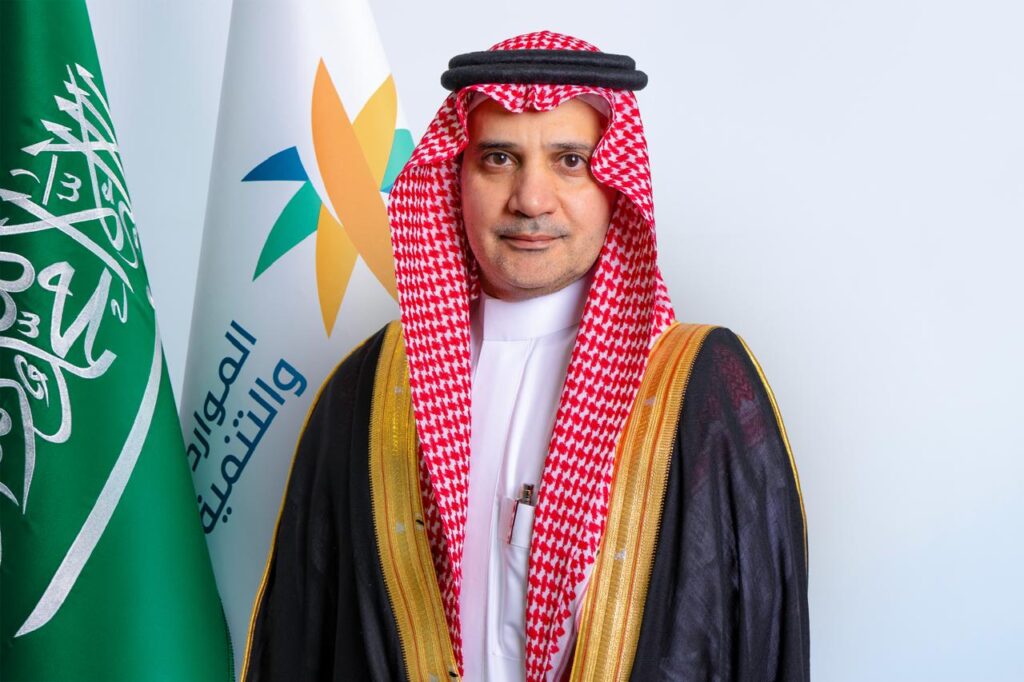
Dr Ahmed AlZahrani
Deputy Minister for Skills and Training, Ministry of Human Resources and Social Development, Saudi Arabia & Chair of the Scientific Committee, Global Labor Market ConferenceDr. Ahmed Alzahrani brings over 25 years of experience in the public sector, serving in diverse roles across policy, research, academia, advisory, and administrative domains. He has held key positions in several government organizations, including a faculty member and Head of the Economic and Finance Department and Director of the Business Center, where he spearheaded the innovation, development, and commercialization of IPA’s intellectual services.He also served as Deputy Director General for the National Labor Observatory at the Human Resource Development Fund, where he played a pivotal role in activating the Labor Market Information System (LMIS). Following this, he became a Senior Advisor for Strategy and Research at the Capital Market Authority (CMA).Since 2018, Dr. Alzahrani has been with the Ministry of Human Resources and Social Development, initially as Deputy Minister for Labor Policies and Chair of the G20 Employment Group in 2020. In the same year, he established and now leads the Deputyship for Skills and Training, driving the national skilling agenda, including the development of the National Skills Strategy, Sector Skills Councils, and National Occupational Standards.Dr. Ahmed sets in many government and private sector boards . He holds a PhD in Economics and Finance from Brunel University London and has research interests in public policy, labor economics, behavioral economics, and financial markets. He is also the Chair of the scientific committee for the Global Labour Market Conference. In recognition of his contributions, he was recently awarded the King Abdulaziz Order (Second Degree) for his national achievements.
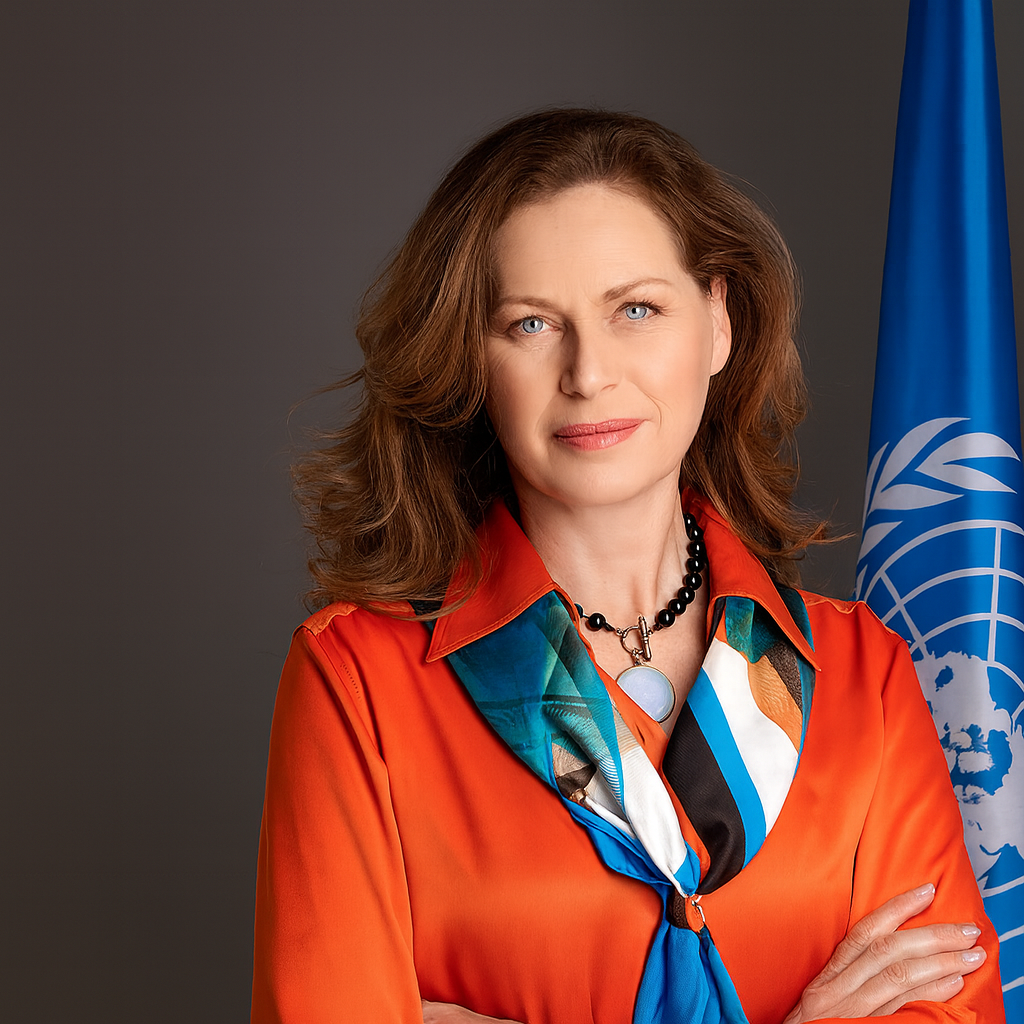
Ms. Ingrid Macdonald
United Nations Resident Coordinator in Albania
Ms. Ingrid Macdonald (Australia) assumed the position of the UN Resident Coordinator in Albania in August 2025.Ms. Macdonald has over 25 years of experience in development cooperation, humanitarian action and peacebuilding. She most recently served as the United Nations Resident Coordinator in Bosnia and Herzegovina, leading a team of eighteen United Nations Agencies, Funds and Programmes dedicated to accelerating sustainable development, human rights and peacebuilding across the country. Prior to that, she served as the Deputy Director of Operations for Asia and the Pacific in the United Nations Office for the Coordination of Humanitarian Affairs (OCHA), Head of OCHA’s Office in Ukraine and as a Director with the Inter-Agency Standing Committee Peer-2-Peer Team, supporting Humanitarian Coordinators and country teams strengthen their collective delivery of humanitarian response. Before joining the United Nations, Ms. Macdonald worked with the Norwegian Refugee Council (NRC) as Representative and Director of Humanitarian Policy in Geneva, and held senior positions in Oslo, Afghanistan, and Pakistan. Prior to NRC, she worked with Oxfam in Sudan and the Solomon Islands, as well as leading Oxfam’s Mining Ombudsman initiative, promoting corporate social responsibility and facilitating conflict resolution between communities and extractive companies across the world. She has also served as a Deputy Director with the New Zealand Defence Force and worked as a management consultant with the private sector in Australia.Ms. Macdonald holds a PhD in history from the University of Toulouse II – Le Mirail, a graduate diploma in international law from the University of Melbourne, and bachelor’s degrees in law and geography from the University of Auckland, New Zealand. She has one daughter.
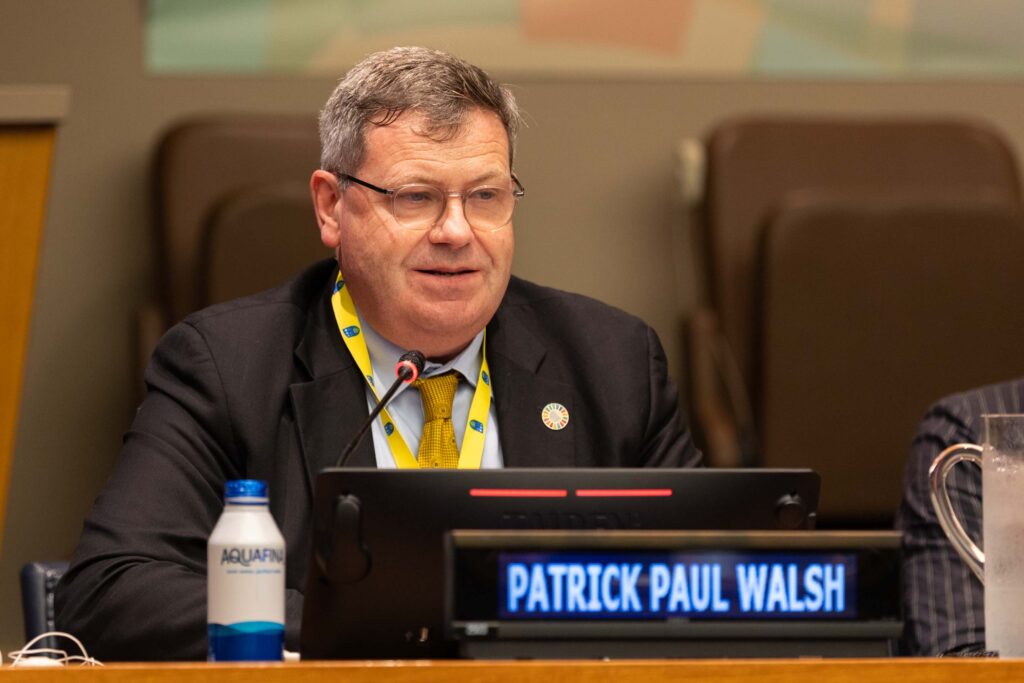
Patrick Paul Walsh
Vice President of Education and Director,
SDG Academy, UN Sustainable Development Solutions Network (SDSN)Patrick Paul Walsh is the Vice President of Education and Director of the SDG Academy at the UN Sustainable Development Solutions Network (SDSN). He is on secondment from University College Dublin where he remains a Full Professor of International Development Studies, Director of the UCD M.Sc. in Sustainable Development in partnership with the SDG Academy and President of the Statistical and Social Inquiry Society (SSISI) of Ireland. He received a Ph.D. in Economics from the London School of Economics and Political Science. He is a Government of Ireland Fellow, Marie Curie (Brussels) Fellow, IZA (Bonn) Fellow, RSA (London) Fellow, EIIR (Brussels) Fellow and REPOA (Tanzania) fellow. He has held academic positions in Trinity College Dublin, K.U. Leuven, Harvard University and Columbia University. He has also held positions in the United Nations, European Commission, IMF and World Bank.

Maria Nakova
Project Leader of BuildSkills Academy, Head of the European Digital Innovation Hub in the Construction Sector and Strategic Development Manager at Cleantech Bulgaria Ms. Maria Nakova stands as a driving force in advancing vocational excellence, digital innovation, and sustainable transformation across Europe’s construction sector. With over 20 years of leadership at the crossroads of innovation, sustainability, and skills development, she has dedicated her career of project management in empowering professionals and businesses to meet the evolving demands of the green and digital economy. As Project Leader of BuildSkills Academy and Head of the European Digital Innovation Hub in the Construction Sector (EDIHCS), Maria spearheads initiatives that elevate workforce capabilities, ensuring that skills development is aligned with industry needs and future-proof strategies. Through her role of Manager strategic development at Cleantech Bulgaria, she actively supports SMEs and public sector in mastering their digital and green transitions, embedding excellence into vocational training and operational practices.A recognized expert in fostering circular economy solutions, Maria has led transformative capacity-building programs, driven innovation transfer, and shaped policy frameworks that accelerate sustainable growth. Her management of large-scale EU-funded projects has delivered actionable policy recommendations, positioning skills and vocational education as key enablers of the twin transition: digital and green, across diverse ecosystems.
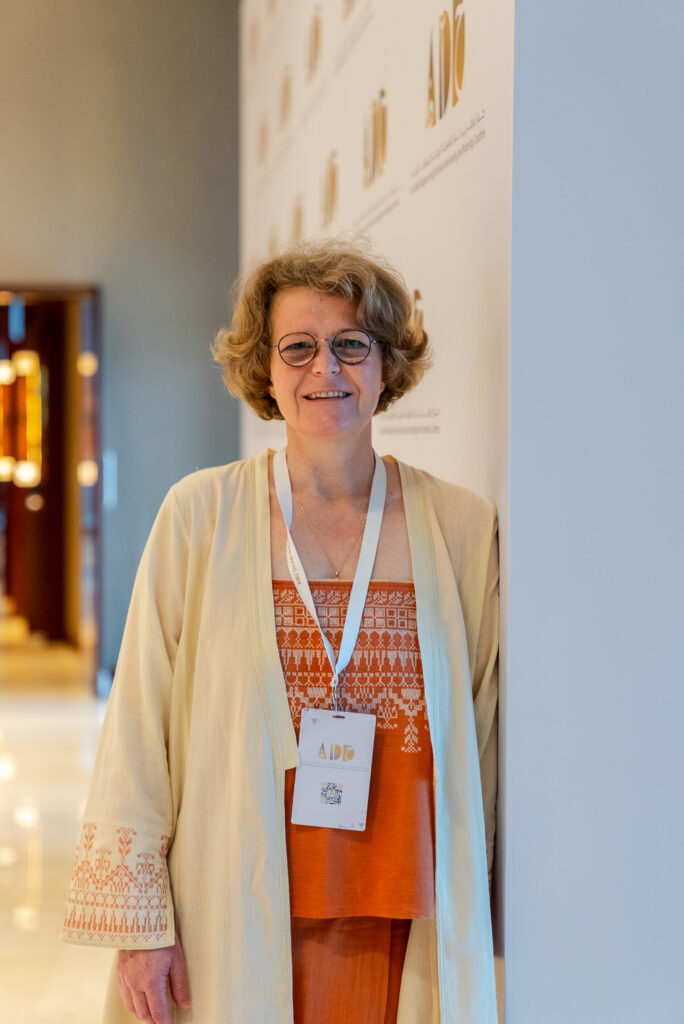
Tanja Dedovic
Regional thematic specialist on labor mobility in MENA, IOMMs. Tanja Dedovic is the Regional Thematic Specialist on Labor Mobility and Social Inclusion at the Regional Office of IOM in Cairo, Egypt, overseeing 17 countries of the MENA region. Ms. Dedovic has been with IOM for 27 years having acquired vast experience working on issues related to Labor Migration, social inclusion, entrepreneurship and diaspora engagement in the Western Balkans, Eastern Europe, Central Asia, Turkey and recently in the MENA region. She holds a licentiate in Political Economy from the University of Fribourg, Switzerland.
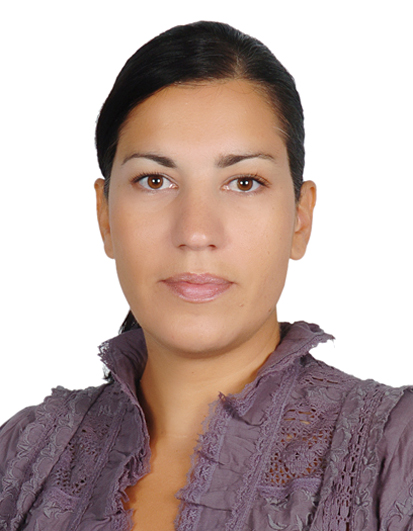
Christianna Tsiterou
Executive Director, Global Labor Market Conference & International Events Christianna Tsiterou is the Executive Director of the Global Labor Market Conference (GLMC). She has over 25 years of experience in large scale strategic projects and in building partnerships that support communities and ecosystems. Prior to joining Takamol/GLMC, Christianna held a variety of leadership roles that included the development, project management, and execution of international projects across the Middle East and Africa, Europe, Southeast Asia and the USA.
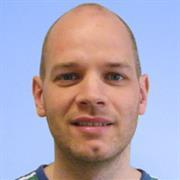
Enda Murphy
Professor School of Architecture, Planning and Environmental Policy, University College Dublin Enda is Professor of Planning at the School of Architecture, Planning and Environmental Policy where he has been programme Director for the Masters in Regional and Urban Planning (MRUP) since 2019. He is also a UCD academic lead for the Sustainability and Climate Committee of Una Europa. Between 2015-2018, he held the position of Vice-Principal for Graduate Studies and Director of the Graduate School for the College of Social Sciences and Law (CoSSL). Beyond the University, he is an active Editorial Board Member of PLOS ONE, one of the world’s leading science journals; he is also a current member of the UN SDSN SDG Academy High Level Advisory Council (HLAC) whose mission focuses on the international development of Education for Sustainable Development. His research interests are broad in scope but centre on the areas of urban transportation and spatial planning, environmental noise, neoliberalism/neoliberalisation, and the UN Sustainable Development Goals (SDGs). He has published widely in the international literature and is author/co-author of more than 100 academic journal papers, book chapters, conference papers and reports and is co-author of three books. Enda has held visiting professor positions at the University of Economics, Ho Chi Minh City, University of Hartford, USA, Cape Peninsula University of Technology, Cape Town, CRENoS, University of Cagliari, and at KTH Royal Institute of Technology, Stockholm. He is a former Fulbright Scholar.
